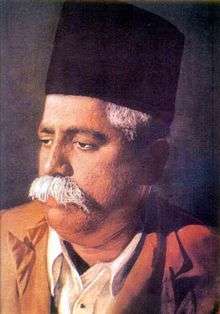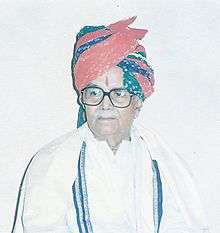List of Sarsanghchalaks of the Rashtriya Swayamsevak Sangh
Rashtriya Swayamsevak Sangh "National Volunteer Organisation"[1] or "National Patriotic Organisation"[2]), is an Indian right-wing, Hindu nationalist organisation that is widely regarded as the parent organisation of the ruling party of India, the Bharatiya Janata Party.[3][4][5][6] The RSS is one of the principal organizations of the Sangh Parivar group. Founded on 27 September 1925, it claimed a commitment to selfless service to India.[7] The organisation is the world's largest voluntary organization.[8]
The Sarsanghchalak is the head of the RSS organisation; the position is decided through nomination by the predecessor.Since the organisation was established in 1925 six people have served as sarsanghchalak. The first, K. B. Hedgewar, founded the organisation served as Sarsanghchalak from 1925–1930 and then again from 1931–1940. The current Sarsanghchalak of Rashtriya Swayamsevak Sangh is Mohan Bhagwat. [9]
List of Sarsanghchalaks
| No. | Name of President | Picture | Life span | Year of Presidency |
|---|---|---|---|---|
| 1 | K. B. Hedgewar |  |
1 April 1889 – 21 June 1940 | 1925–1930. 1931–1940[10] |
| - | Laxman Vaman Paranjpe | 20 November 1877 - 22 February 1958 | 1930-1931 [11] | |
| 2 | M. S. Golwalkar |  |
19 February 1906 – 5 June 1973 | 1940–1973 [12] |
| 3 | Madhukar Dattatraya Deoras |  |
11 December 1915 - 17 June 1996 | 1973–1993 [13] |
| 4 | Rajendra Singh |  |
29 January 1922 – 14 July 2003 | 1993–2000 [14]. |
| 5 | K. S. Sudarshan | 18 June 1931 – 15 September 2012 | 2000–2009 [15] | |
| 6 | Mohan Bhagwat |  |
11 September 1950 | incumbent since 21 March 2009 [16] |
See Also
References
- ↑ "Rashtriya Swayamsevak Sangh (RSS)".
(Hindi: "National Volunteer Organisation") also called Rashtriya Seva Sang
- ↑ Lutz, James M.; Lutz, Brenda J. (2008). Global Terrorism. Taylor & Francis. p. 303. ISBN 978-0-415-77246-4. Retrieved 11 June 2010.
- ↑ McLeod, John (2002). The history of India. Greenwood Publishing Group. pp. 209–. ISBN 978-0-313-31459-9. Retrieved 11 June 2010.
- ↑ Andersen & Damle 1987, p. 111.
- ↑ Horowitz, Donald L. (2001). The Deadly Ethnic Riot. University of California Press. p. 244. ISBN 978-0520224476.
- ↑ Jeff Haynes (2 September 2003). Democracy and Political Change in the Third World. Routledge. pp. 168–. ISBN 978-1-134-54184-3.
- ↑ "A self-goal by the RSS". The Indian Express. 6 January 2016. Retrieved 17 May 2016.
- ↑ Rashtriya Swayamsevak Sangh: National Upsurge.
- ↑ Kanugo, Pralay (2002). RSS's tryst with politics: from Hedgewar to Sudarshan. p. 76. ISBN 9788173043987.
- ↑ Puniyani, Ram. Religion, Power and Violence: Expression of Politics in Contemporary Times. p. 125. ISBN 0761933387.
- ↑ Mohta, Tanmay. "Rashtriya Swayamsevak Sangh (RSS)". Blog. Retrieved 18 August 2018.
- ↑ Jaffrelot, Christophe. The Hindu Nationalist Movement and Indian Politics,. C. Hurst & Co. Publishers. p. 39.
|access-date=requires|url=(help) - ↑ Banerjee, Sumanta. Shrinking space: minority rights in South Asia. South Asia Forum for Human Rights, 1999. p. 171.
- ↑ Islam, Shamsul (2006). Religious Dimensions of Indian Nationalism: A Study of RSS. Anamika Pub & Distributors. p. 36. ISBN 9788174952363. Retrieved 18 August 2018.
- ↑ Jaffrelot, Christophe (2010). Religion, Caste, and Politics in India. Primus Books. p. 205. ISBN 9789380607047.
- ↑ "RSS chief Mohan Bhagwat urges youth to follow path shown by leaders". Times Now. Retrieved 18 August 2018.